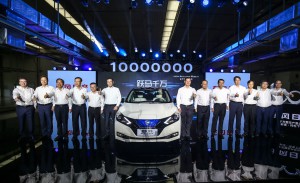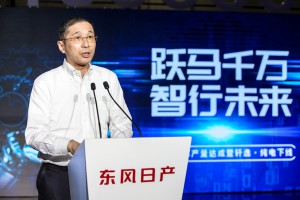Less than two weeks after it announced plans to spend $900 million in the near term to grow its sales in China, Nissan’s first vehicle, a battery-electric model, in that plan began rolling off the assembly line in Guangzhou, China.
The Sylphy Zero Emission, which is based on the Nissan Leaf, is being produced by Nissan and its Chinese partner, Dongfeng Motor Group. The new car costs $25,850, including after government subsidies. It is half of the actual Nissan Leaf sold in China, which is sold by Nissan and Dongfeng’s joint venture Venucia brand.
The new Sylphy can travel 210 miles on a charge and comes at a time where Chinese officials are trying to expand EV sales in the country. There are a slew of companies attempting to take advantage of the incentives tied to the push, including Tesla, General Motors, Fiat Chrysler, Volkswagen, Mercedes-Benz and many others.
Nissan’s new arrival is among the first to hit the market, which officials hope will give them an advantage in the long run.
(Nissan looks to expand production in China. Click Here for the story.)
“We’re confident that the Sylphy Zero Emission rolling off the production line today will become a main player in the EV market,” said Nissan CEO Hiroto Saikawa. “We’re going to roll out a range of EVs that will appeal to customers within all market segments.”
China is a hotbed for sales, accounting for half of global electric car sales last year. That’s the good news. The bad news is most of those were produced by local companies making low-cost models, starting as low as $22,000.
BYD Auto is the biggest player in the market and the biggest EV seller in the world – sorry Tesla – doubling its sales numbers through the first six months of 2018 to more than 71,000 units. Overall, sales of pure-electric and gasoline-electric hybrid vehicles in the first half of 2018 rose 111.5% over a year earlier to 412,000.
(Click Here for more about Nissan spending $9.5 billion to grow China sales.)
The total number of EVs sold in China last year was about 770,000, but the government wants that number to be closer to 2 million electric and gasoline-electric hybrid vehicles by 2020. However, the government efforts to increase EV sales in the world’s largest automotive market amount to less than 5% of overall vehicle sales through the first half of the year, which came in at 11.8 million units.
Nissan and Dongfeng announced plans in February to develop 20 electric models as part of a $9.5 billion, five-year investment program. They said that would include three models this year and three “affordable EV” compacts in 2019.
Nissan executives want to raise its sales by more than 1 million vehicles by 2022 through a mix of new entries, including EVs, and growth of its luxury and low-cost indigenous brands, Infiniti and Venucia, respectively.
(China seeks to add AI to 50% of vehicles by 2020. Click Here for the story.)
Nissan and Dongfeng plan to increase sales to 2.6 million vehicles a year by 2022, up from 1.5 million vehicles last year, using the strategy is calls the “Triple One” gambit. Focusing on EVs and the Venucia brand is critical because they have the most room for growth. It also wants to boost sales of light commercial vans and trucks.


